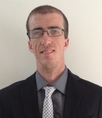
Research Analyst at Koch Asset Management
Q: What were some of your favorite things to do in the OC? (i.e. restaurants, parks, day-trips, nightlife, etc.)
Since we’re close to the beach at Chapman, that was always a place to go. I usually stuck to Laguna, New Port, or Huntington. Other than that, eating out in The Circle, some of the local bars there or down at the beach, or playing some tennis (since I was on the tennis team in undergrad) were top of my list.
Q: What was your educational/career background before you joined the program?
I started at Chapman as an undergrad, originally majoring in Chemistry and Mathematics. In my Sophomore year, I didn’t see much of a future for me in Chemistry, and switched to Computer Science (kept the Math), which I ended up loving. A year after that, I was taking a math elective course with Dr. Porter, heard about the 5-year MSBCE program, and applied.
Q: What was your favorite aspect of the program?
My favorite aspect of the program was how hands-on it was, and how little busy work I felt like I had to do. Throughout my educational career, I always loathed doing things that seemed like work for work’s sake. In this program, I felt like I was working on interesting, real-world problems, and that I had relatively large amount of control over what I was working on and the topics I was researching.
Q: What are you doing now and how did ESI help prepare you?
Directly after graduating I started a job as a Research Analyst with Koch Asset Management, which manages the Koch Industries Pension Fund. I’m still there today. Generally the Research team here (there are four of us currently), develop the views that dictate our portfolio’s positions, but my responsibilities generally fall into two categories: Systems and Research.
For Systems, I’m responsible for building various things that help us do what we do, whether it’s decision-making tools, or reports, or other larger projects. These are done in various programming languages, encompassing both developing back end databases and front end functionality/user interfaces/etc. For example, this year I have been working on a complete redesign of our portfolio trading system, which develops and instructs our portfolio’s positions in the market on a day to day basis.
For Research, my primary responsibility has been developing algorithmic trading models (or discretionary one-off trades) using derivatives across asset markets, globally, that then are implemented in our portfolio. My focus has generally been in risk-premia collection, systematic hedging, risk-transfer/balance sheet transfer with global banks, and exotic structures.
ESI prepared me for my job because, in all honesty, the way we work is nearly identical to the way ESI does. We are research-driven, with a strict adherence to the scientific method. We run experiments just like ESI to test our hypotheses. We have a culture of challenge where we must present our findings to others and have it hold up under the stress of questioning. It was a bit surreal to begin work after graduation and feel like I was right back in the lab at Chapman, but I think that speaks to a program that can not only give you an education, but prepare you for real-world work in the private sector.
Q: Any words of advice for future students?
Work hard.